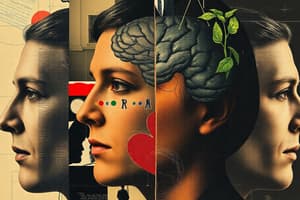Podcast
Questions and Answers
According to the definition provided, what core abilities constitute intelligence across all cultures?
According to the definition provided, what core abilities constitute intelligence across all cultures?
- Learning from experience, problem-solving, and adapting knowledge to new situations. (correct)
- Intuition, emotional understanding, and communicating new ideas.
- Memorization, recall, and speed of information processing.
- Social awareness, leadership skills, and creativity.
What is the central question surrounding the nature of intelligence as a single overall ability versus multiple intelligences?
What is the central question surrounding the nature of intelligence as a single overall ability versus multiple intelligences?
- Whether intelligence is a unified cognitive function or a composite of distinct abilities. (correct)
- Whether intelligence relies more on genetics or environmental factors.
- Whether intelligence can be accurately measured using current testing methods.
- Whether intelligence is fixed at birth or able to be developed over time.
What is the significance of factor analysis in the study of intelligence?
What is the significance of factor analysis in the study of intelligence?
- It is a theory that explains how intelligence changes over the lifespan.
- It is a method used to identify whether intelligence is a 'fixed' or 'growth' mindset.
- It is a statistical approach used to identify clusters of related abilities that contribute to overall intelligence. (correct)
- It is a statistical method used to determine the correlation between brain size and IQ scores.
What is the primary focus of Sternberg's triarchic theory of intelligence?
What is the primary focus of Sternberg's triarchic theory of intelligence?
What is the main idea behind Gardner's theory of multiple intelligences?
What is the main idea behind Gardner's theory of multiple intelligences?
What does research suggest about the relationship between brain volume and intelligence?
What does research suggest about the relationship between brain volume and intelligence?
What was the primary goal of Alfred Binet's intelligence test?
What was the primary goal of Alfred Binet's intelligence test?
What is the formula for calculating Intelligence Quotient (IQ)?
What is the formula for calculating Intelligence Quotient (IQ)?
What does the 'normal curve' (bell curve) represent in the context of standardized intelligence tests?
What does the 'normal curve' (bell curve) represent in the context of standardized intelligence tests?
What is the key distinction between aptitude and achievement tests?
What is the key distinction between aptitude and achievement tests?
What is the purpose of culture-free testing, such as the Raven's Progressive Matrices, in assessing intelligence?
What is the purpose of culture-free testing, such as the Raven's Progressive Matrices, in assessing intelligence?
What does research suggest about the relationship between IQ and success?
What does research suggest about the relationship between IQ and success?
What is the key difference between fluid and crystallized intelligence?
What is the key difference between fluid and crystallized intelligence?
What are the three primary criteria that a psychological test must fulfill to be considered acceptable?
What are the three primary criteria that a psychological test must fulfill to be considered acceptable?
What does standardization in test construction primarily involve?
What does standardization in test construction primarily involve?
What does 'reliability' mean in the context of psychological testing?
What does 'reliability' mean in the context of psychological testing?
How do twin studies contribute to our comprehension of the genetic and environmental determinants of intelligence?
How do twin studies contribute to our comprehension of the genetic and environmental determinants of intelligence?
What is the key takeaway from studies on early intervention and its effect on intelligence?
What is the key takeaway from studies on early intervention and its effect on intelligence?
How does increased schooling typically correlate with intelligence scores?
How does increased schooling typically correlate with intelligence scores?
What is the 'Flynn effect'?
What is the 'Flynn effect'?
What is stereotype threat?
What is stereotype threat?
Which of the following is the best way to foster creative intelligence?
Which of the following is the best way to foster creative intelligence?
How can one take charge of their schedule to improve creative intelligence?
How can one take charge of their schedule to improve creative intelligence?
In the context of the provided information, what statement accurately reflects the role of stimulating settings in nurturing creative intelligence?
In the context of the provided information, what statement accurately reflects the role of stimulating settings in nurturing creative intelligence?
What is a strategy to increase the likelihood of a creative life?
What is a strategy to increase the likelihood of a creative life?
Flashcards
Intelligence
Intelligence
The ability to learn from experience, solve problems, and adapt to new situations using knowledge.
Single vs. Multiple Abilities
Single vs. Multiple Abilities
A debate on whether intelligence is a single general ability or multiple specific abilities.
Factor Analysis
Factor Analysis
A statistical procedure that identifies clusters of related items (called factors) on a test; used to identify different dimensions of performance that underlie a person's total score.
Brain Size and Intelligence
Brain Size and Intelligence
Signup and view all the flashcards
Alfred Binet
Alfred Binet
Signup and view all the flashcards
Lewis Terman
Lewis Terman
Signup and view all the flashcards
Normal Curve
Normal Curve
Signup and view all the flashcards
Aptitude Tests
Aptitude Tests
Signup and view all the flashcards
Achievement Tests
Achievement Tests
Signup and view all the flashcards
Fluid Intelligence
Fluid Intelligence
Signup and view all the flashcards
Crystallized Intelligence
Crystallized Intelligence
Signup and view all the flashcards
Standardization
Standardization
Signup and view all the flashcards
Reliability
Reliability
Signup and view all the flashcards
Validity
Validity
Signup and view all the flashcards
Nature vs. Nurture in Intelligence
Nature vs. Nurture in Intelligence
Signup and view all the flashcards
Early Intervention Effects
Early Intervention Effects
Signup and view all the flashcards
Schooling Effects
Schooling Effects
Signup and view all the flashcards
Flynn Effect
Flynn Effect
Signup and view all the flashcards
Stereotype Threat
Stereotype Threat
Signup and view all the flashcards
Study Notes
- Intelligence (in all cultures) is the ability to learn from experience, solve problems, adapt to new situations, and use your knowledge.
- Key controversies surrounding intelligence include if it is a single, overall ability or many specific abilities, and if it can be located and measured in the brain using neuroscience techniques.
Factor Analysis and Intelligence
- Two-factor theory defines a "g" factor.
- Sternberg's triarchic theory includes analytical, creative, and practical intelligence.
- Gardner's multiple intelligences consist of verbal, mathematical, spatial, bodily-kinesthetic, musical, interpersonal, intrapersonal and naturalist.
Neurological Measurability
- There is a moderate correlation (about +.40) between brain volume and intelligence.
- Scores on verbal intelligence tests decrease as brain size decreases with age.
Historical Roots of IQ Testing
- Alfred Binet developed a test to predict children's progress in the Paris school system.
- Lewis Terman adapted Binet's test, calling the new version the Stanford-Binet Test.
- The term Intelligence Quotient (IQ) comes from Terman's formula: IQ = (mental age / chronological age) X 100
Normal Curve
- Standardized tests establish a normal distribution of scores in a bell-shaped pattern.
Aptitude and Achievement Tests
- Aptitude tests are intended to predict the ability to learn a new skill.
- Achievement tests are intended to reflect already learned knowledge.
- The optimal IQ test is exclusively a test of aptitude, but all are, at least slightly, tests of achievement as well.
- Improvements upon the Binet test include the Raymond B. Cattell (culture-free testing), Wechsler (WISC and WAIS), and Raven's Progressive Matrices.
- Raven's Progressive Matrices feature pattern recognition and does not have a language component.
- People of higher IQ also tend to attain higher levels of education, and both factors contribute to greater professional success.
Fluid vs. Crystallized Intelligence
- Fluid intelligence is the ability to think quickly and creatively, peaking in early adulthood.
- Crystallized intelligence is how much knowledge one already has and increases well into late adulthood.
Principles of Test Construction
- A psychological test to be accepted must fulfill standardization, reliability, and validity.
- Standardizing a test involves administering it to a representative group of test takers to establish meaningful comparison.
- A test is reliable when it yields consistent results.
- Reliability does not ensure validity.
- Validity refers to the extent to which the test measures what it is supposed to.
Genetic and Environmental Influences
- Studies of twins, family members, and adopted children show clear evidence of genetic and environmental effects on intelligence.
- Early neglect from caregivers impoverishes the development of intelligence.
- Increased schooling correlates with higher intelligence scores.
- Over the past century, intelligence scores have risen steadily by approximately 30 points, known as the Flynn Effect.
Stereotype Threat
- Stereotype threat is a self-confirming concern that one will be evaluated based on a negative stereotype.
- This phenomenon has appeared in intelligence testing among groups that have historically faced discrimination.
Creative Intelligence
- Living a More Creative Life:
- Be Surprised by Something Everyday.
- Surprise At Least One Person a Day.
- Write Down what Surprised You and Others.
- When Something Sparks an Interest, Follow It.
- Wake with a Specific Goal.
- Take Charge of Your Schedule.
- Spend Time in Stimulating Settings.
Studying That Suits You
Use AI to generate personalized quizzes and flashcards to suit your learning preferences.




